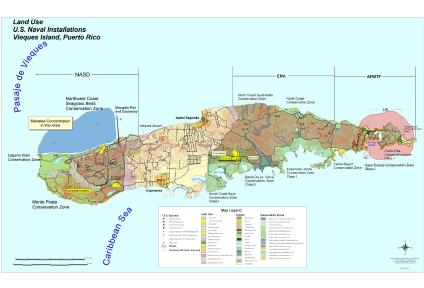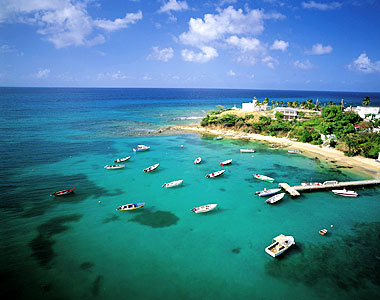A Vieques op-ed I wrote in early 2000

NOT ONE MORE BOMB IN VIEQUES: A MESSAGE TO THE AMERICAN PEOPLE
>
> Carmelo Ruiz-Marrero
>
> Millions of Americans learned in the first week of May (2000)
> that there is an island in the Caribbean Sea named
> Vieques, and that it is the site of a peaceful,
> nonviolent struggle against the most powerful military
> apparatus in the world.
>
> On May 4th, hundreds of U.S. marshals, FBI agents and
> Puerto Rican riot police came to this idyllic
> island-town of Puerto Rico to remove hundreds of
> protesters that were camping in lands that the U.S.
> Navy uses as a firing range.
>
> The Navy occupied 26,000 of Vieques's 33,000 acres in
> 1941, and has since then used those lands not only for
> target practice, but also for naval maneuvers,
> amphibian landings, munitions storage and toxic waste
> disposal.
>
> In April of last year a stray bomb killed a civilian
> security guard working in the firing range. That was
> the last straw for the residents of Vieques and for
> concerned citizens from all over Puerto Rico. For more
> than a year, protesters, which included members of
> religious, student and peace organizations, camped in
> the range in order to serve as a human shield to
> prevent the bombing from resuming.
>
> Civil disobedience? Who's really being disobedient
> here? The Puerto Rico Bar Association determined that
> the United States government is violating its own laws
> in Vieques, including the Endangered Species Act, the
> Clean Air Act, the Clean Water Act, the National
> Environmental Policy Act and the much-celebrated
> Executive Order on Environmental Justice, signed by
> president Clinton himself; as well as international
> commitments, like the United Nations Charter, the
> Universal Declaration of Human Rights, and the 1992
> Rio Declaration.
>
> Defenders of the Navy are quick to claim that the only
> obstacle to solving the Vieques crisis is the
> protesters, who are allegedly seeking a confrontation
> that will worsen the U.S.'s relations with Puerto
> Rico. They point out that Clinton proposed a
> referendum in which the island-town's residents will
> decide whether or not they want the Navy to stay.
>
> Let's take a closer look at this referendum. Vieques
> residents will have to choose between two options: the
> Navy stays or goes. But if they vote for the Navy's
> departure, it will stay for three more years,
> practicing with inert non-explosive ammunition for 90
> days a year. Plus the Navy gets to determine the
> parameters of the referendum, even its date.
>
> The people of Puerto Rico do not want the Navy to stay
> three more years or even three more hours in Vieques.
> They want its immediate and permanent withdrawal.
> Nothing else will do.
>
> signed a memorandum of understanding with the
> government of Puerto Rico in which it committed itself
> to help protect Vieques's environment and help with
> its economic development. Last year the Navy admitted
> that it had not honored the promises it had made in
> the memorandum. In any case, how many treaties with
> Native Americans has the U.S. government honored?
>
> What if this time the Navy breaks its word "by
> mistake"? It admitted last year that it had tested
> depleted uranium ammunition in Vieques, but claimed
> hat it had done so by mistake. The death of that
> security guard last year was also a mistake. The
> bombing of the Chinese embassy in Belgrade was also a
> mistake. And the downing of an Iranian civilian
> airliner in broad daylight on international airspace
> over the Persian Gulf in 1988 was also a mistake. How
> many more mistakes or "mistakes" will have to happen
> before the U.S. government understands that its
> military is not wanted in Vieques, not for one more
> day?
>
> And why is the military supervising this referendum?
> In a democracy, the military is supposed to stay
> awayfrom politics, especially electoral politics.
> Would Americans tolerate the Pentagon intervening in
> elections?
>
> Why are Vieques residents the only ones allowed to
> vote in this referendum? Isn't this a matter of
> concern to all Puerto Ricans? Imagine if a foreign
> power were to occupy Oregon and Americans in the other
> 49 states were told to butt out and mind their own
> business. Americans shouldn't have to tolerate
> something like that for a second.
>
> If an injustice were to take place in Alabama, for
> example, it would be a matter of concern to all
> Americans, not just to those living in that state.
> Therefore, all Puerto Ricans should be able to vote on
> the future of Vieques.
>
> Why a vote at all? Did the Navy hold elections to
> occupy Vieques? Did it even ask for permission when it
> evicted thousands of its residents in the 1940's? Did
> the U.S. hold elections when it invaded Puerto Rico
> and its warships bombed San Juan in 1898?
>
> The Clinton directive on Vieques has been described in
> the media as a deal that the President made with
> Puerto Rico governor Pedro Rosselló. It is not a deal.
> It is an order of the President of the United States
> to the governor of a colony with no voice or vote in
> Washington.
>
> There are some who call the protesters anti-American.
> But the opponents of the Navy presence in Vieques are
> no more anti-American than the 19th century
> abolitionists or the 20th century civil rights
> movement.
>
> Americans living in the fifty states must make it
> clear to president Clinton that he must do the right
> thing as Commander in Chief of the Armed Forces and
> order the Navy to end its training activities in
> Vieques immediately and permanently, and clean up the
> toxic mess it made there. If the Navy doesn't like it,
> that's just too bad. In a democratic republic, the
> civilians are in charge, not the military. At least
> that's what we were all taught in school.
>


0 Comentarios:
Publicar un comentario
Suscribirse a Comentarios de la entrada [Atom]
<< Página Principal